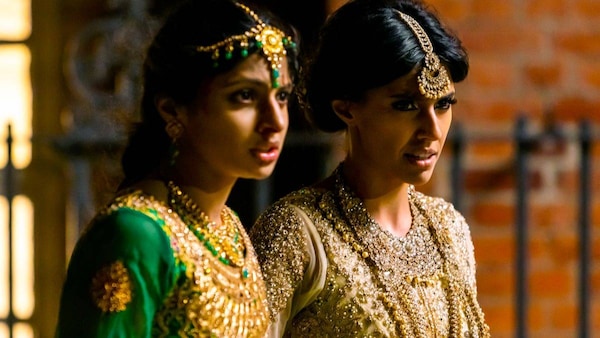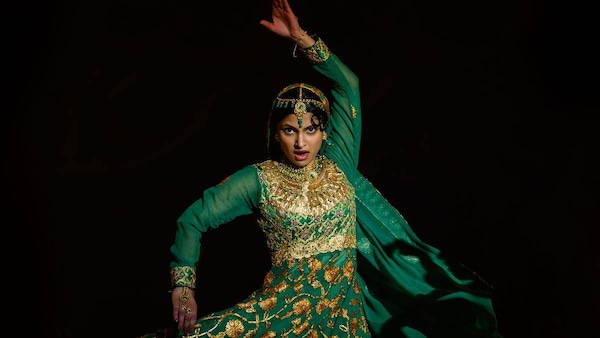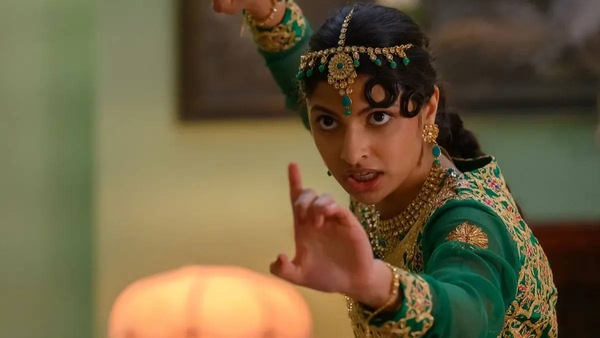Nida Manzoor's Polite Society Isn't Interested In Minding Its Ps & Qs
...The sparkling action comedy has a subversive punchline to deliver. This is #CineFile, where our critic Rahul Desai goes beyond the obvious takes to dissect films and shows that are in the news.

Last Updated: 03.08 PM, Apr 28, 2023
A TEENAGER lashes out when her 20-something sister falls in love. She feels betrayed and threatened. They were rebels together. Now she is convinced that her sister has succumbed to the conventions of companionship. She is also convinced that the Prince Charming isn’t exactly the Prince Charming everyone thinks he is. She can’t understand why nobody else sees the red flags. She can’t fathom why nobody else believes her. So the disgruntled sibling sets out to sabotage the grand wedding. As a result, she has emotional showdowns with her sister as well as the groom’s family. But she doesn’t give up. It’s the most trying phase of her young life.
This is the storyline of Nida Manzoor’s Polite Society. At first glance, it sounds like a familiar tale of coming-of-age angst. One can almost visualise the verbal jousts and the grim reckonings. But the genius of this film lies in its stubborn defiance of genre etiquette. Manzoor imagines — or reimagines — Polite Society as a rip-roaring action comedy. The commentary is stitched into the DNA of the film. Here’s how it actually goes: A British-Pakistani teenager, Ria Khan (a charming Priya Kansara), is an aspiring stuntwoman who runs a martial arts channel called Khan-Fu. Ria’s elder sister, Lena (Ritu Arya), is in a funk after dropping out of art school. When vulnerable Lena is successfully set up with an eligible Pakistani bachelor, Salim (Akshay Khanna), at a fancy Eid party, Ria is furious. She knows that this ‘settling’ is Lena’s rebound from the heartbreak of losing her way. She also suspects that Salim’s wealthy mother — the Queen Bee of the local Muslim community, Rahela (Nimra Bucha) — is a devious villain. What follows is an adventure full of wannabe spy missions, bone-crunching and bloody face-offs, rom-com wit, and a chaotic climax that uses a famous Devdas song better than Devdas once did.
This playful synthesis of treatment and cultural identity is not new. We saw it recently with Miss Marvel. One can even describe Polite Society as: The Archaic Practice of Arranged Marriage through the lens of a Marvel-Stanning Gen-Z Influencer. But the thing about this film is that the treatment is not (just) a gimmick. If anything, it validates the over-the-top mindset of a generation that we often dismiss as impulsive and flimsy. The exaggerated tone is Ria’s fantastical way of making sense of the regressive world. (In a not-so-parallel universe, Ria’s woke and impassioned tweets are probably being mocked by boomers). She looks at problems a little more dramatically than the rest, because she’s a social media kid whose sensibilities and ideals are derived from a melange of pop-culture moments. Any situation, for her, is an excuse to service her hyperactive perspectives.

So if the reality of a scene is “School bully teases Ria,” she processes it as “Ria engages in no-holds-barred combat with a bully in the cafeteria while classmates bay for blood”. If the reality is “Ria and Lena have a teary argument in the bedroom,” she processes it as “Ria and Lena have a door-smashing, wall-denting and nose-bleeding mano-a-mano”. If the reality is “Rahela chastises Ria for being rude and irrational,” she processes it as “Rahela and Ria embark on a gravity-defying battle for the ages”. And most of all, if the reality reads “Rahela finds her son Salim a suitable housewife,” Ria likely processes it as “Mastermind Rahela tests fertility of human vessels with Momma’s Boy Salim in a hidden lab to find the suitable candidate to breed clones of herself”. For those aware of the tender toxicity of South Asian mother-son love, the war cry of “Salim wants to put his mom in his wife!” just hits differently.
Thanks to Ria, the heightened pitch of the film is an integral part of its emotional language. Even the sabotage set pieces — the stealing of a laptop from a gym; a botched condom-centric framing of Salim; the kidnapping of Lena from her own wedding where Ria distracts with her vexed version of Madhuri Dixit’s ‘Maar Daala’ dance — are basically stand-ins for Ria struggling to reason with her brainwashed sister. You sense that they’re only words and feelings being exchanged in a normal immigrant household. But Ria’s personality elevates this dispute and interprets it as a massive do-or-die mission. In a way, it brings to mind Everything Everywhere All At Once, a verse-jumping and audacious action extravaganza that uses narrative scale to inflate the conflicts of Asian-American living. This may not be as ambitious as the Oscar-winning movie, but the smaller subterfuge is not without purpose. A younger character’s projections are perhaps not as complex or personal as the middle-aged protagonist from Everything Everywhere All At Once. For instance, vivid facial expressions — perhaps a product of the movies that Ria has grown up consuming — play a bigger role than psychological wormholes and laundry-and-taxes epiphanies.

Which is why Ria Khan’s journey ties in with a patriarchal society’s innate inability to take (those like) her seriously. She is routinely told to stop ‘imagining’ things or ‘dreaming’ of a stunt career, and yet it’s this imagination and dreamscape that defines her agency in an adult-dominated story. The genre is essentially a distillation of her voice that refuses to be silenced just because it’s young and restless. Even the editing — the funny jump-cuts do the job of visual punchlines — mirrors Ria’s alleged lack of attention span. Since she thinks in the currency of storytelling, the mid-sentence cuts are a cute ode to her meme-sized sense of humour. The film’s reading of feminism, too, is honest and messy. It’s fashioned not as the fight to win but to merely exist on one’s own terms. Ria claims that she wants Lena to fulfill her talent as an artist, but she sets out to break Lena’s engagement so that the older sister can pave the path for the younger to pursue her own career. So that Lena can normalise the idea of rebellion rather than fetishise it. Compare this to the unbearable masculinity of the recent Salman Khan starrer, Kisi Ka Bhai Kisi Ki Jaan, which revolves around three younger brothers playing cupid for the eldest so that he paves the path for them to pursue their own marriages.
It isn’t explicitly shown, but you can tell that Lena was the first Khan to break the shackles and raise hell to enter art school. Her disillusionment now is not in society but in herself, for it stems from the fact that she failed to follow through on a passion she fought so hard to earn. Ria is perceptive enough to notice this. But she hopes to rescue herself by rescuing her sister. Ultimately, it’s the eye-popping form of the action comedy that pushes Ria to wage a more selfless war. Those acrobatic punches and kicks finally come from the heart, not the body, which in turn allows Ria to hone her skills for her loved ones. That it simply becomes about saving her sister from a future of forced motherhood and sacrifice is a triumph of Nida Manzoor’s vision. The mask becomes the film; the style becomes the substance. Hers is a superhero film without being one. But it’s also a ‘feminist’ drama without being one. Somewhere in between, politeness pretends to be a society without really being one.
